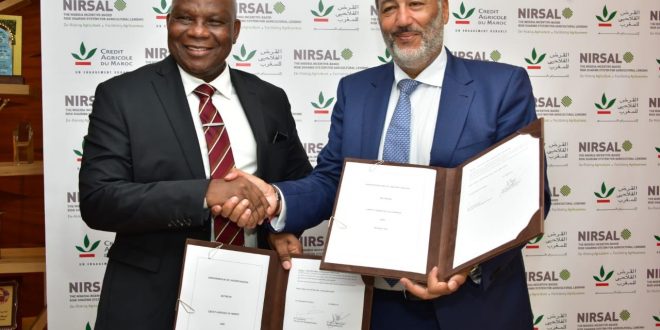In a development that has rekindled their six-year partnership, the Nigeria Incentive-Based Risk Sharing System for Agricultural Lending and Credit Agricole Du Maroc (CAM) have signed a Memorandum of Understanding that is geared towards the promotion of inclusive growth and sustainable development of the agriculture sectors of both countries through the facilitation of finance and investment, trade and support systems across agricultural value chains, with emphasis on smallholder farmers.
A visit to Nigeria in 2016 by the King of Morocco, Mohammed VI, began the initial pact between NIRSAL Plc and CAM.
It formed part of 15 bilateral agreements signed by the King and President Muhammadu Buhari on behalf of their countries.
Six years later, NIRSAL Plc and CAM met again.
This time at the head office of the latter in Rabat, to review activities under the agreement and rekindle the partnership.
The latest meeting expanded the scope of their pact to include B2B relationships, capacity building, knowledge transfer and digital agribusiness risk management solutions.
Among the short and medium-term undertakings outlined by the MOU, NIRSAL Plc and CAM will work towards presenting a common front to the managers of the Land Degradation Neutrality Fund in a bid to attract global finance for sustainable agribusiness investments.
CAM’s deep experience in developing solutions for the financial integration of smallholder farmers in Africa would also benefit NIRSAL Plc in opening up more pathways for critical finance to enter the agricultural primary production sub-sector in Nigeria.
On behalf of their institutions, the Managing Director/CEO of NIRSAL Plc, Aliyu Abdulhameed, and the Chairman of the Management Board of Credit Agricole Du Maroc, Tariq Sijilmassi, signed the MOU, thereby committing to the mutual prospecting and implementation of agriculture-oriented projects that benefit both organisations and their host countries.
During the MOU signing event, Abdulhameed elaborated on NIRSAL Plc’s areas of need to include the development of financing products that suit the seasonality of agriculture and other farming contexts, and emphasising the difficulties smallholders experience in keeping to the terms of conventional bank financing products.
Abdulhameed is confident that innovative financing products that speak to the peculiarities of agricultural primary production would help agriculture financiers to maximise the benefits and incentives in the 75 per cent Credit Risk Guarantee issued by NIRSAL Plc for primary production projects, as well as Interest Drawbacks of up to 40 per cent that diligent borrowers can enjoy.
Leveraging NIRSAL’s CRG facility, commercial lenders in Nigeria have injected over N152.8 billion into the agriculture sector in the last six years, with credit crystallisation rate still below 1 per cent.
NIRSAL Plc, a pacesetter in the modern, innovative use of blended finance to spur the growth of agriculture, has been a reference point for emerging Development Finance Institutions across Sub-Saharan Africa.
CAM, however, is a more experienced institution from which, according to Abdulhameed, NIRSAL Plc is eager to learn.
Established in 1961, CAM is a universal bank that “finances all sectors, with agricultural expertise as a particular vocation”.
Within the framework of national investment programs, CAM works to enhance agricultural activities and stabilise rural populations by sustainably improving their standard of living.
Beyond its agricultural expertise, CAM is also involved in several other financing projects, particularly in rural areas, through its network of 543 branches across the Kingdom of Morocco.
With special abilities in the design and deployment of products and services that are tailored to customers’ needs, CAM has ingrained itself into the very fabric of Moroccan life whilst holding equally sizeable portfolio abroad.
Consequently, through its 60 years existence, the bank has granted over $10 billion in loans, making a profit of $430 million.
The agreement between NIRSAL Plc and CAM draws further relevance and validation from the South-South Cooperation, the technical cooperation among developing countries in the Global South.
It is a tool used by the states, international organisations, academics, civil society and the private sector to collaborate and share knowledge, skills and successful initiatives in specific areas such as agriculture development, human rights, urbanisation, health and climate change.
 Hottestgistnaija.com
Hottestgistnaija.com





